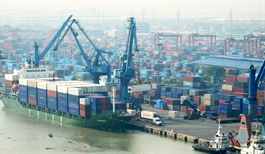Gauging efficient investment channels for the year
Gauging efficient investment channels for the year
Looking back on 2022, right from the outset of the year, the economy rebooted strongly, reflected in economic growth data and banks’ lending practice. Yet by the end of the year, there were signs growth slowing due to the impacts from external and internal factors on the economy.
This had shown in financial markets: the stock market lost more than 30 per cent of its value; the corporate bond market and real estate market became frozen; the gold market fluctuated strongly; and banks scaled up interest rates to attract depositors.
The State Bank of Vietnam (SBV) then had to expand the credit room many times for banks in 2022 and by the end of the year had raised the credit ceiling to 15.5-16 per cent.
In 2023, investors do expect the stock market to rally, and in fact the market did recover slightly before dropping again, showing that Vietnam’s financial market is still unstable.
In this context, the bond market is still frozen. The Ministry of Finance is considering amending regulations on the corporate bond market to restore development.
Meanwhile, the war between Russia and Ukraine continues to escalate and is likely to widen tensions. The world economy has been plagued with high inflation in many countries. In the US, although inflation has been somewhat controlled, the rate still fetches high and other Western countries are in a similar situation.
Western nations, including the US, are likely to continue raising the interest rate, but the rate jump would be lower than in 2022 because inflation has been somewhat contained.
All such external factors could greatly affect local economy, exacerbating difficulties in the financial and securities markets. In addition, as the US continues to raise the base rate, the Vietnamese stock market would further wobble.
Similarly, central banks around the world continue raising their interest rates, which may cause the SBV to follow suit because the greenback and other currencies continue to appreciate, causing VND to depreciate more. The SBV therefore needs to keep the exchange market stable to fight inflation.
This year, Vietnam is likely to experience high inflation after the consumer price index had expanded 3.15 per cent in 2022. Furthermore, albeit the country’s GDP growth reached 8.02 per cent in 2022, people’s living standards still have many difficulties.
Leveraging these factors, I have not seen any effective investment channel at this point of time. Bank deposits are still deemed the safest, but profitability is not high despite rising interest rates.
There are three principles to ensure for efficient investment – capital adequacy, high profitability, and high liquidity. The stock market proves a very risky investment channel currently, with the possibility for the market to return to 1,500 point range in 2023 unlikely.
The government is striving to regain investor trust in the corporate bond market, yet in my view this market may remain frozen at least in the first half of 2023.
The real estate market reports a huge supply, especially in the high-end segment and resort properties, versus slow selling. The segment of housing catered towards low- and medium-income people has tremendous demand, but this segment does not attract investor attention because it is tough to make high profits.
The real estate market this year may continue to be quiet, unless the interest rate is adjusted to a low level and real estate dealers provide products to suit the needs of society.
As the conflict in Ukraine is unlikely to be resolved this year may even escalate, the situation in the gold market might become more optimistic. In addition, high inflation in many countries is likely to push gold price even higher. Yet, this is a rather risky market in Vietnam so it is necessary to closely monitor the gold situation both domestically and internationally.
As the SBV would confront rising exchange rate threat, it proves necessary to take measures to stabilise the market and the economy.
Accordingly, the SBV needs to consider raising interest rate to rein in inflation, limit the amount of money into circulation, as well as increase the value of VND, from there containing the exchange rate.





















